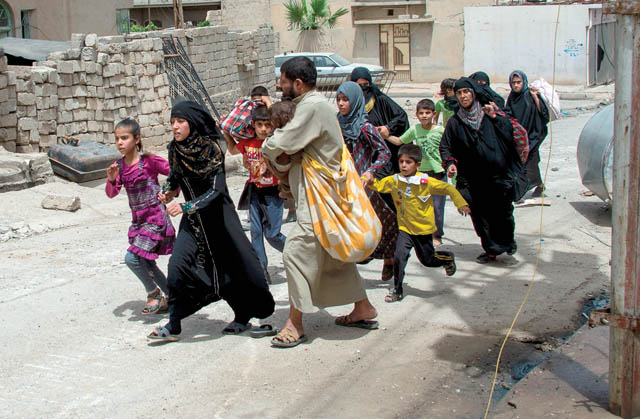BAGHDAD — Extremists preparing for a desperate last stand in Mosul are booby-trapping homes with civilians inside and welding doors shut on starving families to prevent the population from fleeing, residents say.
Iraqi forces are closing in fast on the Old City and its narrow streets, where the Daesh terror group is expected to focus its significantly depleted military capabilities.
"Daesh came to our house and welded the door. They gave us a small amount of water and a white cloth and said: 'Here's a shroud for you'," said one resident of Zinjili neighbourhood.
The woman sent a voice message to a relative living in the "liberated" eastern side of Mosul and said she was now trapped in her own house with her husband, her four children and no food.
Resources were already scarce when the huge government offensive to wrest back Mosul from Daesh was launched in October last year.
After more than six months of fighting, the living conditions of residents of the last neighbourhoods Daesh still holds are beyond dire.
A 35-year-old man who gave his name as Abu Rami and lives in the Old City of west Mosul said Daesh was desperate to keep the population from running away.
“They have been doing this lately. When they suspect a family is intending to escape to the security forces, they lock them in,” he told AFP by phone.
Hunger the biggest killer
“They have detained several families like this here, and in some cases they weld the doors to be sure,” he said. Houses in Mosul often have barred windows or are built around walled courtyards with a single door onto the street.
“Those families have a choice of dying of hunger, disease or shelling.”
Abdulkarim Al Obeidi, a civil activist from Mosul, said an estimated 250,000 people were still trapped in the old city and the handful of other areas that remain under Daesh control.
“Daesh is locking doors on families inside those areas that have not, yet, been liberated. They are detaining people,” he said.
He put the number of Daesh fighters defending their last redoubts in west Mosul at around 600, meaning that the extremists are massively outnumbered and making the resort to human shields an increasingly important part of their defence strategy.
“Daesh members have everything they need because they raided people’s homes and took their food stockpiles,” Obeidi said, advocating airdrops to save thousands from starving to death.
“Daesh wants to sow terror among civilians with this filthy tactic of welding doors shut on people,” said Hossameddin Al Abbar, a councillor for Nineveh, the province of which Mosul is the capital.
“There are people dying of hunger and disease now, especially children and elderly people,” he said, adding that it was impossible to know exactly how many.
“At this stage, hunger is killing more than shelling and fighting.”
Booby traps
Another method residents say Daesh has used to prevent a civilian exodus is booby-trapping, a weapon the extremists had previously used mainly to kill or maim the advancing government forces.
A senior officer of the interior ministry’s elite Rapid Response forces said they had found several families stuck in booby-trapped homes since the launch last week of an operation in northwestern Mosul.
“The Daesh gangs are booby-trapping houses with people inside them,” Major General Thamer Abu Turab told an AFP reporter in west Mosul.
“We found eight such houses, where our EOD [ordnance disposal] teams were able to defuse the devices and get the families out,” he said.
The extremists’ deterrence seems effective as cases of families attempting to flee Daesh-held areas before the arrival of the federal security forces are relatively rare.
Many of the civilians who are not locked in by Daesh essentially do it themselves and hunker down in basements with whatever food supplies they still have.
Abu Imad, a middle-aged former restaurant employee who lives with his family of five in the Zinjili neighbourhood, said the population was terrified.
“Behind the walls on the streets, there are rooms and cellars packed with people too scared to move. And hunger is killing people now,” he told AFP by phone.
“I know some people have started eating plants and are boiling paper. At this rate you will soon see people eating cats and dogs.
